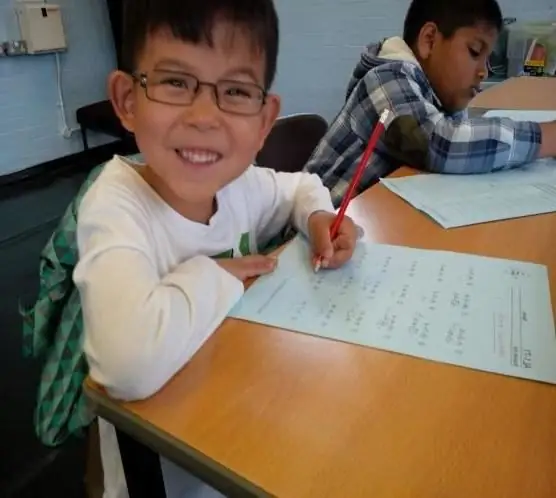2026 Author: Priscilla Miln | [email protected]. Last modified: 2025-01-22 17:55:27
Parents of future first-graders often joke that preparing a child for school is as difficult as preparing an astronaut for the first flight. And partly this is true. Constant changes in education standards confuse moms and dads, and especially grandparents. And before the parents who collect the child for school, the question arises of what exactly the child should know by the first grade.
It's good to start preparing for school a year before entering. This will give the child the opportunity to meet teachers and choose his "second mother", adapt to new school conditions and develop the skills necessary for a future first grader.
But if there is no such opportunity or time has already been lost, it does not matter. Let us consider in detail everything that a child should know by grade 1 according to GEF.
Psychological aspects of school readiness
The most important skill that a child going to first grade should have will not be knowledge of certain disciplines, but his psychological readiness for school. It includes the ability to perceive new knowledge, join a new children's team, perseverance. The psychological immaturity of a child can turn primary school into an unbearable burden and discourage the desire to learn.

So that in the first grade the baby does not encounter such problems as non-assimilation of material in mathematics or writing due to his restlessness or distracted attention, the primary task of parents is to help the baby in overcoming psychological problems. Of course, kindergarten teachers and psychologists have the task of psychological preparation for school, but you should not completely and completely rely on other people. No matter how professional they are, no one knows your child better than you.
Check for readiness
So, let's look at the psychological skills that will help the baby to easily meet the new stage of his life - entering school.
| Persistence and craving for knowledge | Concentration of attention in preschoolers takes a short period of time. And to learn new material for 30-45 minutes (standard lesson time) is beyond his power. Therefore, the primary task of the mother of the future first grader will be to develop his perseverance and interest in new knowledge. |
| New knowledge is the key to success | Mom and dad should motivate the child correctly: you go to school to become an educated person; the knowledge you gain will help you not only succeed, but also make the world a better place. (Not like this: go to school, all children at your age goto school). |
| Studying well is the main task | Explain to your child that going to school is an important and responsible task. You can compare his lessons at school with the work of parents. Work is rewarded (salary). And the reward for good studies will be high grades. Do not reward your child with money for good grades. He must understand that the meaning of study is to gain new knowledge. |
With mandatory entry to school at the age of six, parents and children have no choice between going to school or waiting.
Psychological preparation of children for school - entirely in the hands of his parents. Their care, attention and support will be needed by the baby when he takes the first steps on his new school path. Relatives and friends will help to cope with the difficulties of this life stage and share the first joys and successes.
Is your baby ready for school?
The main indicator of readiness to study without problems in the first grade, after the psychological aspects, is the development of speech in the baby. It is the development of the speech apparatus that determines the level of preparation of the child and serves as the main criterion for its development as a whole.
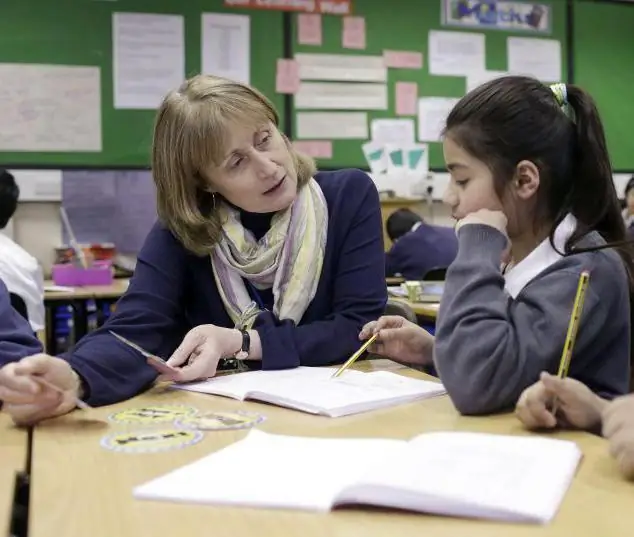
For school to be a joy, applicants must:
- Pronounce all sounds clearly and correctly.
- Feel the rhythm of speech (pronounce all the syllables in words with difficult pronunciation).
- Be able to participate in a general discussion, feel free to speak in front of the whole class.
- Highlightgiven sounds in the general flow of speech.
- Be able to ask questions on assignments.
- Learn to give a detailed answer to the question.
In addition to having a competent and correct speech, a number of requirements are imposed on the future student. Let's consider in detail what a child should know by grade 1 and what skills to have in each subject.
Math
To successfully master the 1st grade material in mathematics, a preschooler must:
- Know the name of the numbers from 0 to 9 and count up to 10.
- Continue the series of numbers from any digit, not only from 1.
- Know the "neighbors" of each digit, counting up to 10.
- Name the greater and lesser of two numbers within 10.
- Distinguish simple geometric shapes: square, rhombus, circle and triangle.
- Make simple math problems that require you to add or subtract numbers.
- Group items based on their color, shape, size.
How to help
Helping your child learn the necessary math skills is easy. Play a game with him - count the birds outside the window, the houses you pass, the cars while you are driving.
While walking in the park, draw numbers with a stick on the ground, lay them out of small stones or write on the pavement with colored crayons.
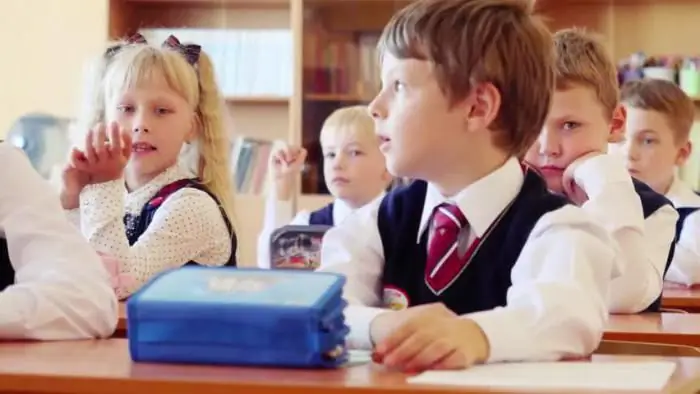
Play with your baby to school. Orally ask a simple task: the cat has 2 pink bows and 3 blue ones. And how many of them are there? The child can write the answer on a piece of paper. This will help him to hearassignments and practice writing numbers.
Reading
There is no single answer to the question of whether a child should be able to read in syllables at 5-6 years old. The discussion about this continues among mothers and teachers. Adherents of the ability to read use the argument of a busy school curriculum in their favor. Their opponents argue that reading instruction is best left to professionals.
Therefore, to teach your child to read or not, everyone decides for himself. And it depends on the individual characteristics of the baby. If you managed to instill an interest in letters in a playful way, and your daughter or son learned to read, great!
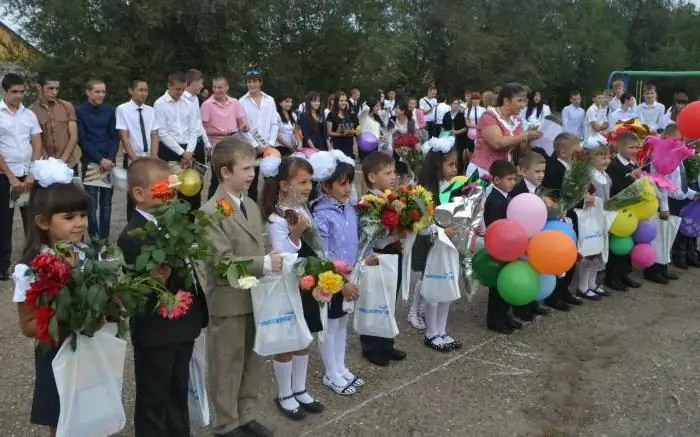
But if attempts to teach a child to read lead to strong resistance on his part, do not insist. Otherwise, you risk forever taking away his love not only for books, but for learning in general.
If the ability to read in syllables at 5-6 years old is not required from a child, then he must have some basic skills:
- Know letters and understand what sounds they correspond to.
- Select the given sound from the word.
- Make up words with the right letter.
- Know what a sentence is, find its beginning and end.
- Understand the heard text, be able to analyze it.
- Give answers to questions to the text.
Instill in your child a love of literature. Read together those books that interest him. These can be stories about animals, fairy tales or children's magazines. Play with words more often. It is possible to combine these games with the gameinto the ball. Choose words starting with a certain letter, look for a letter in different words, make new words from a word by rearranging letters, divide words into syllables (you can sing them).
Letter
If the question of whether to teach a child to read is debatable, then teaching him to write capital letters is definitely not worth it. After all, the rules for writing letters are slightly, but still changing. And retraining a child to write on them is much more difficult than teaching someone who has never tried to write.

But for successful learning to write, there are criteria that a child should know by grade 1:
- Understand the difference between consonants and vowels.
- Know the difference between sound and letter.
- Find a letter at the beginning, middle or end of a word.
- Be able to break a word into syllables.
Develop motor skills of hands
If it is not worth teaching the baby to write, then it is necessary to develop his fine motor skills. To do this, it is worth disassembling with the child, as:
- Hold a pen (pencil, paintbrush) in hand.
- Fold a given geometric figure from matches or sticks for counting.
- Depict an animal, a person.
- Paint without going over the edge.
- Draw lines without a ruler.
- Make the desired figure out of plasticine.
- Cut out the drawn elements from paper.
- Create printed letters from the pattern.
Take time to develop motor skills. For this, sculpting, drawing, folding puzzles and creating applications are suitable. Good finger motor skills will help the future student not only with creative tasks at school, but also develop beautiful handwriting and fluent speech.
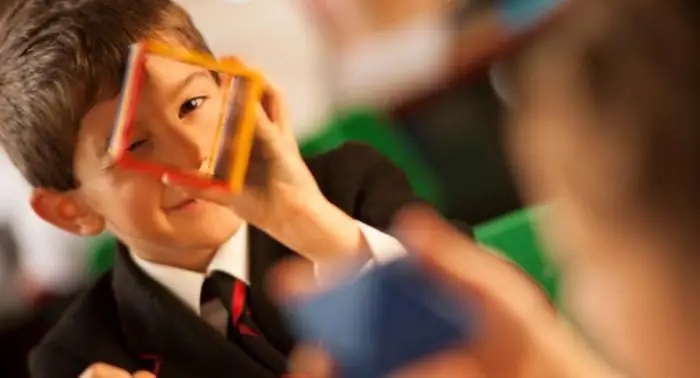
When entering school, be prepared to test what your child needs to know by grade 1. Tests or oral interview - the procedure is chosen at the discretion of the administration of the educational institution you are trying to get into.
Everyday skills needed for a child going to first grade
In addition to what a child should know by grade 1, there are a number of skills he needs at home for a successful “school career”. The child who is responsible for his range of duties at home gets used to the school routine faster and easier. Most preschoolers already know how to wash themselves, make their beds, and fold their things.
When preparing for the school stage of a child's life, it is worth teaching him the following:
- Fold your own backpack. To begin with, he will do this under the dictation of an adult. Then it is enough to double-check whether everything is in place. And the third stage is the child's own responsibility for the collected things.
- Prepare in the evening the clothes in which he will go to class.
- Observe the regime of the day and week. In order not to miss additional classes or workouts, you can make notes on the calendar with a bright marker.
- Keep your "workplace" clean. And it is the responsibility of moms and dads to control the correct lighting and the height of the chair.
Checking out for the first timelist of skills required for a first grader, you may be shocked. But don't panic. After all, every year schools are replenished with new first-graders, whose level of preparation is very different from the established standards. The most important thing is to help the child to believe in himself, his strength. Going to first grade, the baby must be sure that you will come to his aid at any time.
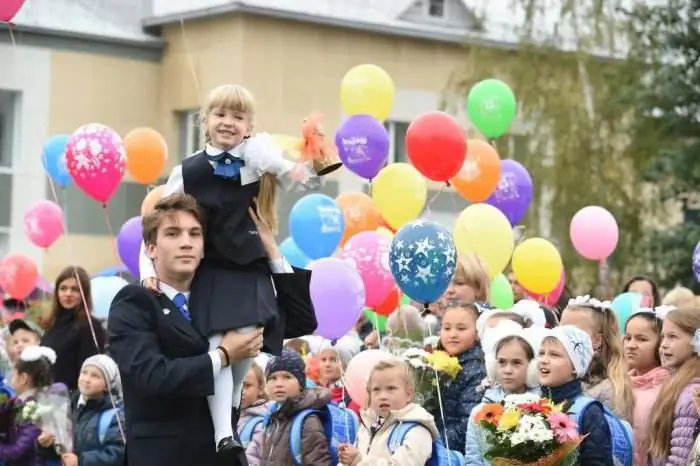
Get ready for school with the whole family, work with your child in a playful way and motivate him to succeed. Then you can easily give a positive answer to the question of whether the child is ready for school.
Recommended:
All parents should know the rules for transporting a child in a car

Most Russian families today have a car. However, do not forget about road safety. Every parent must know the rules for transporting a child in a car
What should kids know at 4? What should a 4 year old be able to do?
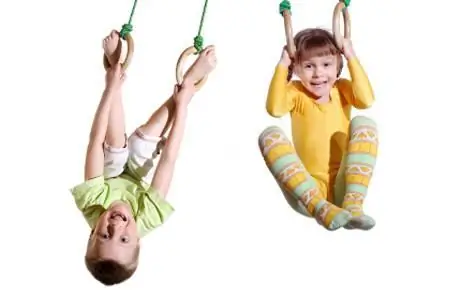
When a child reaches the age of four, it's time for parents to think about the level of his intellectual development. To properly assess the situation, moms and dads should learn about what children should know at 4 years old
Middle class math: what should parents know?

Mathematics in the middle group should meet the age characteristics, the requirements of the educational program and the individual level of development of the child. What should a child know at 4-5 years old? How does the teacher teach mathematics in the middle group? Where can parents get assignments? You will find answers to all these questions in the article with examples of problems in mathematics
What should a child know at 3? Age features of children 3 years old. The development of the speech of a child of 3 years
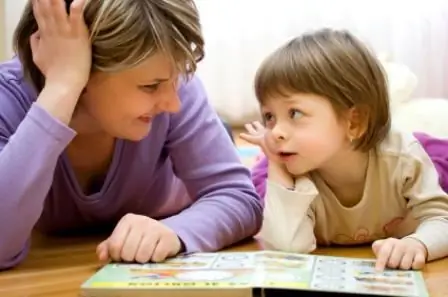
Most modern parents pay a lot of attention to the early development of children, realizing that up to three years the child learns easily during the game, and after that it becomes much more difficult for him to learn new information without a good initial base. And many adults face the question: what should a child know at 3 years old? You will learn the answer to it, as well as everything about the features of the development of children at this age from this article
What should a child know at 6? Speech of a 6 year old child. Teaching children 6 years old
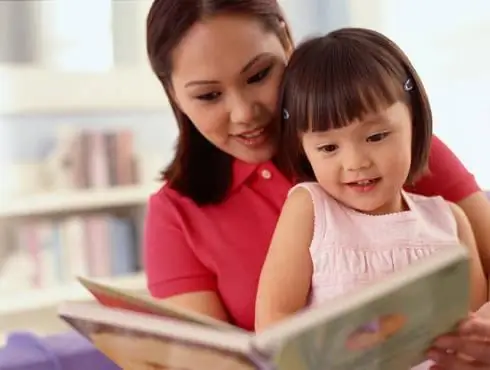
Time flies fast enough, and now your baby is 6 years old. He is entering a new stage of life, namely going to first grade. What should a child know at 6 years old before going to school? What knowledge and skills will help a future first-grader better navigate school life?

